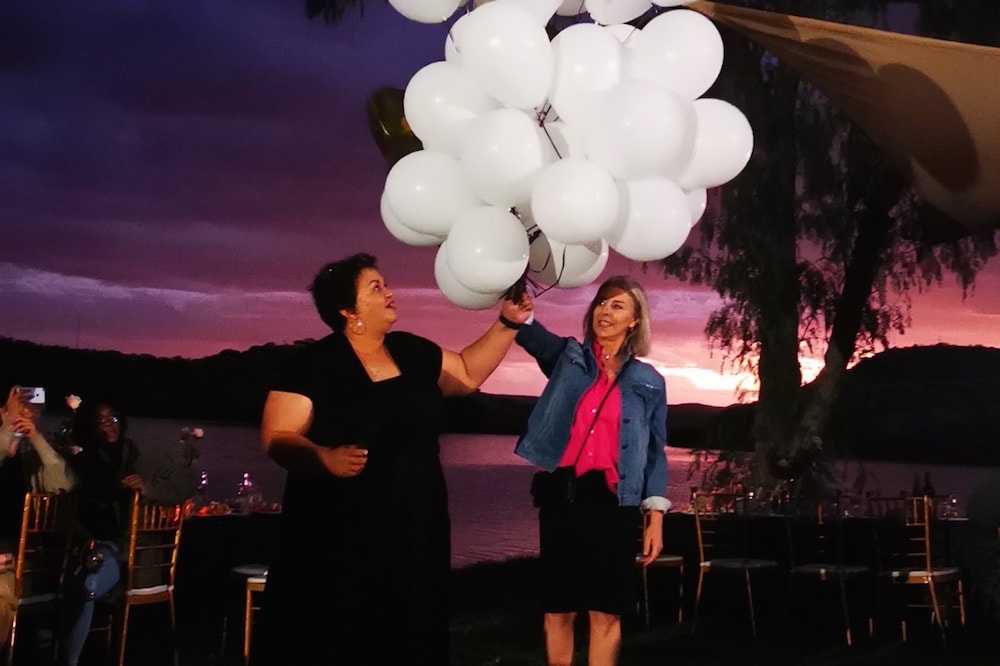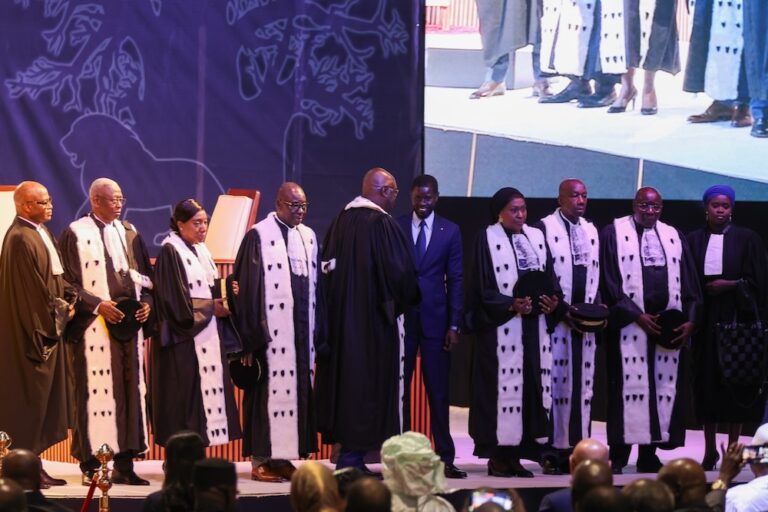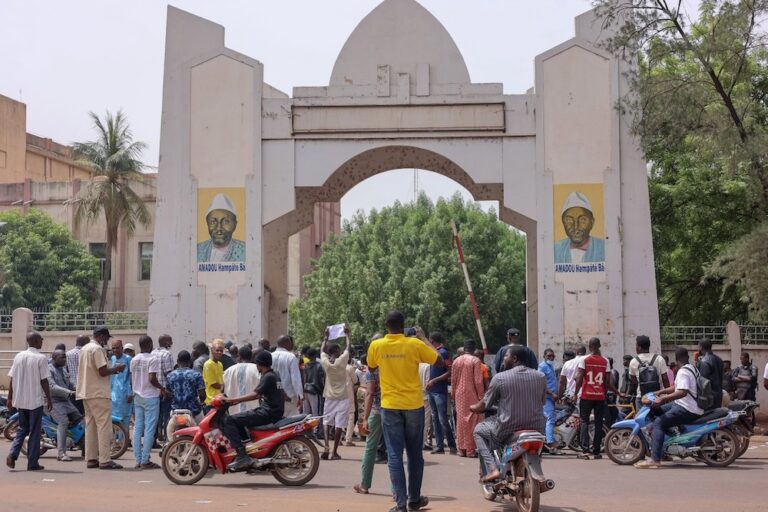May 2021 in Africa: A free expression round up produced by IFEX’s Regional Editor Reyhana Masters, based on IFEX member reports and news from the region. An audio discussion relating to this piece is available here.
On 3 May, the release of 30 balloons into Windhoek’s night sky by Gwen Lister – Namibia’s national champion of the 2021 UNESCO World Press Freedom Day conference – and Zoe Titus of the Namibia Media Trust, marked the unofficial finale of the global conference.
It also marked the 30th anniversary of the adoption of the Windhoek Declaration in 1991, which paved the way for promotion of freedom of expression, envisioning a free, independent and pluralistic media in Africa. The 1991 declaration was a catalyst for similar declarations across the world, and the closing date of the 1991 conference, 3 May, was subsequently adopted by the United Nations General Assembly in 1993 as World Press Freedom Day.
The week-long hybrid conference featured discussions on the safety of journalists, media sustainability, media literacy and the concept of “information as a public good”. In her keynote address Jamesina King, the African Commission on Human and People’s Rights Special Rapporteur on Freedom of Expression and Access to Information, mentioned the marked improvement in media freedom on the continent, but expressed her concerns at “cases of murder, enforced disappearances, arrest, harassment, intimidation and other human rights violations which persist, often with impunity.”
The presentation of papers concluded with discussions and the adoption of the Windhoek +30 document which modernised the first declaration by acknowledging digital transformation and the crucial role of the internet.
During the conference, the Namibia Media Trust (NMT) and IFEX member the Media Institute of Southern Africa (MISA) launched their newspaper insert, the African Free Press, and a dedicated online website which features articles on topics ranging from disinformation, media representation, media law and policy. MISA-Zimbabwe also released a regional report on violations against journalists in Southern Africa focusing on freedom of expression, digital rights, the political and legal landscape, and media violations.
WPFD sentiment blurred by killings and abduction
Just a few weeks after the continental celebration, the sentiments behind World Press Freedom Day were obscured by the killings, in separate incidents, of Barthelemy Kubanabandu Changamuka from the Democratic Republic of Congo and Ethiopian Sisay Fida. In both cases, friends say that the journalists expressed a sense of foreboding before they were murdered.
Kubanabandu Changamuka – who worked at Coraki FM, a community radio station in Kitshanga in Masisi in the troubled eastern region of DRC – was shot eight times at close range by two unknown men while he was on his way home after concluding his weekly programme on air.
UNESCO Director-General Audrey Azoulay condemned Fida’s killing and called “on the authorities to investigate the circumstances of this crime and ensure that its perpetrators are held to account.” Fida was shot and killed on his way home, in the town of Dembi Dollo in the Oromia region of Ethiopia on 9 May. Prior to his death, Fida received anonymous threatening telephone calls over coverage of news on western Ethiopia by the Oromia Broadcasting Network (OBN).
Meanwhile, in restive Mali, which was very recently suspended from the Economic Community of West African States (ECOWAS), French journalist Olivier Dubois was kidnapped by an armed group and is yet to be released by his captors. Reporters Without Borders have established a group of 11 individuals and entities, whose aim, according to RSF secretary-general Christophe Deloire, is “co-ordinating civil society strategy and initiatives in support of this French journalist’s release, and to carry out awareness-raising, communication and advocacy actions for as long as necessary to achieve this goal.”
Ironies of Africa’s #IDAHOBIT
Just as May came to a close, Frank Mugisha, the executive director of Sexual Minorities Uganda (SMUG), was arrested along with 44 members of the LGBTQI+ community in Uganda, during a raid. At the time of going to press, more details were not available.
The irony of the raid and arrests speaks to the many struggles and issues of the LGBTQI+ community across Africa that were brought to the fore on 17 May to mark the International Day Against Homophobia, Biphobia, and Transphobia (IDAHOBIT) under the theme “Together: Resisting, Supporting, Healing!”
Mugisha and his organisation have been pushing for the removal of Clause 11 of Uganda’s Sexual Offences Bill which was passed by Parliament on 3 May. The Bill offers protective measures in addressing sexual violence, by safeguarding sexual assault survivors’ rights during criminal proceedings and criminalising sexual harassment by people in positions of authority. These progressive clauses are pitted against provisions that criminalise same sex consensual sexual relations between adults and prohibit anal sex. Human Rights Watch (HRW) points out that “it even provides that if Ugandans perform these sexual acts outside Uganda they can be prosecuted in Uganda.” The proposed legislation now awaits Presidential assent.
Amnesty Kenya and the National Gay and Lesbian Human Rights Commission (NGLHRC) issued a joint statement calling for greater protection of, in particular, LGBTQI+ refugees. The statement made reference to the death of Chriton Atuhwera following a homophobic arson attack at Kakuma camp – home to 160,000 refugees from South Sudan, Sudan, Somalia, the Democratic Republic of the Congo, Burundi, Ethiopia, and Uganda.

https://www.facebook.com/NGLHRC/photos/a.279010468922248/1930248770465068/
Just five days before IDAHOBIT, makeup artist and Cameroonian social media influencer and celebrity Njeuken Loic (aka Shakiro) and Mouthe Roland (aka Patricia) were sentenced to five years in jail and fined 200 000 CFA francs (USD 352).
The women were arrested In February 2021 (primarily for cross dressing) while having dinner. They were prosecuted for attempted homosexual conduct, public indecency, and non-possession of their national identity cards. The two were denied bail while the trial, originally scheduled for 24 March, was twice postponed. The final verdict was delivered on 11 May.
For the two transgender women, their imprisonment in a men’s prison is tantamount to a death sentence.
Even Ghana, Africa’s ‘human rights beacon,’ has turned up the volume of repression against its LGBTQI+ community.
On 16 May police, accompanied by journalists, raided a meeting and arrested and detained 21 people, charging them with unlawful assembly. According to a Reuters report: “Rights organisation Rightify Ghana said the group had met to share insight on how to document and report human rights violations being experienced by LGBT+ Ghanaians.”
Four organisations supporting LGBTQI+ rights in Ghana have been assisted in setting up a GoFundMe page to secure the release of the activists.
Conservative groups in Senegal held a rally during which participants demanded the criminalisation of homosexuality. Ousmane Kouta, one of the student protestors, said, Senegal “is homophobic and will remain so forever” – a sentiment shared by many conservatives across the continent.
The price of oil: Arbitrary arrest of Ugandan HRD
Italian journalist Federica Marsi was arrested along with Ugandan human rights defender Maxwell Atuhura by the resident district commissioner and the district police commander (DPC) of Buliisa – the oil region of Uganda. They were about to meet with local community members to discuss the impacts of Total’s Tilenga oil project. Both were interrogated and reportedly threatened by police. Marsi was released after a couple of hours, but Atuhura remained in custody for two days before being released.
Les Amis de la Terre France point out: “like many other human rights defenders who speak out against oil-related issues, Maxwell has been facing repeated threats and intimidations. In recent weeks, he has received a large number of anonymous threatening phone calls, and both his home in the oil region and his family’s home in the capital – several hundred kilometres away – have been broken into.”
Leaders in press freedom backsliding
Mauritius’ proposed amendments to its ICT law and Ghana’s interrogation of Citi TV reporters could dent their media rights records and push them lower in the RSF World Press Freedom Index. Positioned at 30 and 61 respectively, Ghana and Mauritius are two of the best performing countries in Africa in terms of freedom of expression.
In 2018 Ghana was ranked no 1 in Africa on the RSF World Press Freedom rankings – the same year that it hosted the global World Press Freedom Day Conference in Accra. This distinction was then reinforced by the passage of the Right to Information Act in 2019. However, as reported by IFEX member the Media Foundation for West Africa (MFWA), the manner in which TV journalist Caleb Kudah was arrested, along with the raid on Citi TV premises by armed security officers in their attempt to arrest Zoe Abu-Baidoo, is concerning.
If the proposed amendments to Mauritius’ ICT Act are passed by its Parliament, it could turn the island paradise into a surveillance state. In her analysis, senior lecturer in Media and Communication Studies at the University of Mauritius Christina Meetoo points out that the vague amendments could be in violation of Section 12 of Mauritius’ constitution, which guarantees freedom of expression.
After their analysis of the proposed amendments, MISA-Zimbabwe have also made submissions to the Ministry of Information Technology Communication and Innovation and ICTA, focused on the creation of safe online spaces “while protecting digital rights, more specifically freedom of expression, access to information, and the right to privacy.”
In Brief
On 1 May, Zambian journalists Francis Mwiinga Maingaila and Nancy Malwele were assaulted during clashes between two factions of the ruling Patriotic Front at party headquarters. Maingaila lost his camera, wallet, and phone. Zambian President Edgar Lungu condemned the incident in his World Press Freedom Day message.
Ghanaian journalist Peter Tabiri was assaulted by Ghana National Security officers who conducted a raid on an alleged illegal casino in Asankragua township. While Tabiri was trying to confirm if the raid had been conducted legitimately, he was assaulted by the officers and had his phone smashed. He was rescued from further attacks by the division commander, with whom he had been communicating during the raid.
Just days before WPFD, Ugandan journalists Amon Kayanja and Teddy Nakaliga were whipped by soldiers and had their equipment destroyed while they were covering a protest in the town of Kuyanga about a two-week power outage.
Initially detained for allegedly missing his criminal defamation court date – which his lawyer says he was not informed about – Angolan editor Francisco Rasgado was acquitted of libel and defamation charges.
New and Noteworthy
Veteran journalist and press freedom advocate, Gwen Lister has launched her memoir, “Comrade Editor.” As the first female and founding editor of The Namibian, Lister is best known for her rigorous reporting which exposed South Africa’s systematic apartheid atrocities from inside her adopted country, Namibia. She writes about The Namibian’s role in the independence of the country and why she chose to fight the South African apartheid system from within Namibia rather than in South Africa.
In a rather bizarre-sounding move, the Nigerian Senate has proposed legislation seeking to impose 15-year jail terms for citizens paying ransom demands. The Terrorism Prevention (Amendment) Bill, 2021, is apparently intended to respond to a spate in kidnappings in the last 18 months which risk being seen as a ‘fast and lucrative business’. Okechukwu Nnodim is one of several journalists who was kidnapped this year and released after a few days. Amra Ahmed Diska was abducted from her home by gunmen in Adamawa State, held captive for a week, and only released after the payment of a ransom.
On 8 June Unwanted Witness will launch #ChasedAwayAndLeftToDie a comprehensive report on the exclusion of citizens from Uganda’s national digital ID system and the impact of this on those rejected from the process.
If you enjoyed reading this piece, check out our June 2021 episode of Africa Brief, our monthly audio discussion between IFEX Regional Editor Reyhana Masters and IFEX Network Engagement Coordinator Nazarene Njeru about some of the key issues impacting Africa’s free expression landscape.



